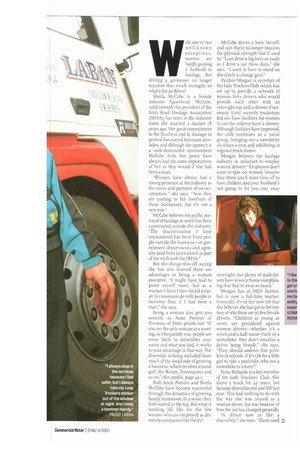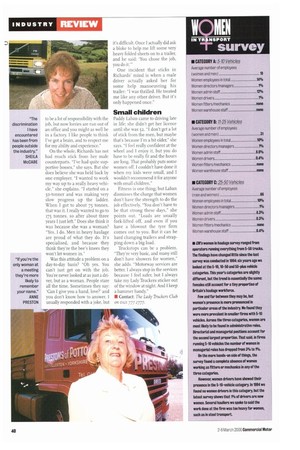ith one or two well exceptions, women are hardly gaining
Page 41

Page 42

If you've noticed an error in this article please click here to report it so we can fix it.
a foothold in haulage. But driving a 4o-to n ner no longer requires that much strength, so what's the problem?
Sheila McCabe is a female industry figurehead. McCabe. until recently the president of the Irish Road Haulage Association (I RHA), has been in the industry since she married a haulier 18 years ago. Her great commitment to the business and to haulage in general has earned her many accolades. and although she agrees it is a male-dominated environment McCabe feels her peers have always had the same expectations of her as they would if she had been a man.
"Women have always had a strong presence in the industry as the wives and partners of owneroperators," she says. "Now they are coming to the forefront of these businesses, but it's not a new role," McCabe believes the public portrayal of haulage as sexist has been constructed outside the industry: "The discrimination I have encountered has been from people outside the business—in government departments and agencies (and from journalists!) as part of my work with the I RHA,"
But she shrugs this off, saying she has also learned there are advantages to being a woman executive. "T might have had to prove myself more, but as a woman I think I have found it easier to communicate with people in business than if I had been a man,' she says.
Being a woman also gets you noticed, as Anne Preston of Pres tons of Potto points out: "If you are the only woman at a meeting, as I frequently was, people are more likely to remember your name and what you said. It works to your advantage in that way. The downside is being excluded from much of the social side of growing a business, which revolves around golf-, the Rotary, Freemasons and Soon." (See profile, page 42.)
Both Anne Preston and Sheila McCabe have become successful through the dynamics of growing family businesses. In a sense, they both started at the top. But what is working life like for the few women who are employed as drivers by companies like theirs?
McCabe drives a lorry herself, and says that it no longer requires the physical strength that it used to: "I can drive a big lorry as easily as I drive a car these days," she says. "I used to have to stand on the clutch to change gear."
Pauline Morgan is secretary of the Lady Truckers Club, which was set up to provide a network of women lorry drivers who would provide each other with an overnight stay and a shower if necessary. Until recently truckstops did not have facilities for women to use the toilet or have a shower. Although facilities have improved, the club continues as a social group, bringing out a newsletter six times a year and exhibiting at regional truck shows.
Morgan believes the haulage industry is reluctant to employ women drivers: "Employers don't want to take on women because they think you'll want time off to have children and your husband's not going to let you stay away overnight; but plenty of male drivers have wives at home complaining that they're away so much."
Morgan has an HGV licence but is now a full-time teacher. Ironically, it's in her new job tha: she believes she has got to the bottom of why there are so few female drivers. "Children as young as seven are prejudiced against women drivers—whether it's a seven-and-a-half tonne truck or a motorbike, they don't visualise a driver being female," she says. "They should address this problem in schools. Wit's OK for a little girl to ride a pushbike, why not a motorbike or a lorry?"
Ilona Richards is a key member of the Lady Truckers' Club. She drove a truck for 22 years, but became disenchanted and left last year. This had nothing to do with the way she was treated as a woman driver, but was because of how the job has changed generally.
"A driver now is like a microchip," she says. "There used to be a lot of responsibility with the job, but now lorries are run out of an office and you might as well be in a factory. I like people to think I've got a brain, and to respect me for my ability and experience."
On the whole, Richards has not had much stick from her male counterparts. "I've had quite supportive bosses," she says. But she does believe she was held back by one employer. "I wanted to work my way up to a really heavy vehicle," she explains. "I started on a 50-tonner and was making very slow progress up the ladder. When I got to about 75 tonnes, that was it. I really wanted to go to 175 tonnes. so after about three years I just left." Does she think it was because she was a woman? "Yes. I do. Men in heavy haulage are proud of what they do. It's specialised, and because they think they're the bee's knees they won't let women in."
Was this attitude a problem on a day-to-day basis? "Oh yes. You can't just get on with the job. You're never looked at as just a driver, but as a woman. People stare all the time. Sometimes they say: 'Can I give you a hand, love?' and you don't know how to answer. I usually responded with a joke, but it's difficult. Once I actually did ask a bloke to help me lift some very heavy folded sheets on to a trailer. and he said: 'You chose the job, you do it.'" One incident that sticks in Richards' mind is when a male driver actually asked her for some help manoeuvring his trailer: "I was thrilled. He treated me like any other driver. But it's only happened once."
Small children
Paddy Laban came to driving laic in life; she didn't get her licence until she was 52. "I don't get a lot of stick from the men, but maybe that's because I'm a bit older," she says. "I feel really confident at the wheel and I enjoy it, but you do have to be really fit and the hours are long. That probably puts some women off. I couldn't have done it when my kids were small, and I wouldn't recommend it for anyone with small children."
Fitness is one thing; but Laban dismisses the charge that women don't have the strength to do the job effectively. "You don't have to be that strong these days," she points out. "Loads are usually fork-lifted off, and even if you have a blowout the tyre firm comes out to you. But it can be hard changing trailers and strapping down a big load.
Truckstops can be a problem. "They're very basic, and many still don't have showers for women," she adds. "Motorway services are better. I always stop in the services because I feel safer, but I always take my lady Truckers sticker out of the window at night. And I keep a hammer handy,"
• Contact: The Lady Truckers Club on 0121 777 2777.








































































































